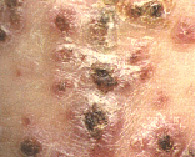Syphilis cases have increased in Singapore for the second year in a row among men who have sex with men (MSM), according to a study of MSM by AfA. The number of Syphilis cases had risen from 14 in 2001 to 21 in 2002 and 38 last year along with other sexually transmitted diseases including genital/anal warts, gonorrhoea, and NGU (nongonoccocal urethritis) which is an inflammation of the urethra (the tube that carries urine and semen through your penis).
What is syphilis?
Syphilis is a serious infection caused by bacteria known as treponema pallidum. Syphilis can be divided into three stages - the primary and secondary stage (the infectious stages) and late tertiary stage, which is not infectious to sex partners but can result in damage to the person's major organs like the brain, heart, eyes and joints.
Symptoms and signs

Primary Syphilis - a painless and firm ulcer (called a chancre) develops at the site of infection (penis, anal, mouth, scrotum) after nine to 90 days. If left untreated, the chancre will heal by itself within a few weeks. This does not indicate that the infection is cured; on the contrary the infection is actually spreading throughout the body.
Secondary Syphilis - rashes on palms, soles, and body usually appear within three months after the initial infection, coupled with flu-like symptoms (fever, lethargy, swollen glands). Other less common symptoms include moist, fleshy growth near the groin and anus, hair loss, etc. This is the most infectious stage. If left untreated, the rashes may also disappear; once again this does not mean that the infection is cured.
It must be emphasised that not all patients demonstrate early symptoms. Furthermore many may not be aware of infections occurring in the rectum or throat, while others may ignore mild rashes and flu-like symptoms which can be mistaken for a common throat infection and viral rash. Blood tests for syphilis one to three months after exposure will be able to diagnose the infection.
Latent Syphilis - this is the period where there are no symptoms or signs, the infection is called latent. Though it is not infectious, the bacteria continue to spread in internal organs. Some infected persons with syphilis remain in this latent stage for the rest of their lives with limited complications.
Tertiary Syphilis - a proportion of infected persons progress to this late stage after five to up to 30 years where internal organs like the heart, brain, eyes, nerves, spinal cord are seriously infected. Usually these people are discovered when they present with heart problems, visual problems, psychiatric or brain complaints etc
Incubation Period
The incubation period is about nine to 90 days for primary symptoms and another three to six months for secondary symptoms.
How is syphilis passed on?
Syphilis is spread by skin or mucosal, e.g. from penis to penis, penis to anus, mouth to anus, mouth to mouth (deep kissing) during the infectious stages. Recent outbreaks in MSM communities have been linked to oral sex in darkrooms of sex clubs. Condoms are usually effective in protecting against syphilis.
Diagnosis
During the primary stage, a test using a special microscope to identify the bacteria in the fluid obtained from the chancre is diagnostic. Experienced laboratory technicians are usually needed for this, e.g. those in the DSC clinic. Sometimes, this technique is the only way to diagnose primary syphilis because the blood test for VDRL (Venereal Disease Research Laboratory Slide Test) or RPR (Rapid Plasma Reagin) may not show up during this early phase or window period.
If a person presents with secondary symptoms, a blood test will usually confirm the diagnosis of secondary syphilis.
All latent and late syphilis are diagnosed by blood tests.
Treatment
Syphilis is a treatable and curable infection. Penicillin given by injection is the drug of choice; it effectively cures a person with syphilis in the early stage and prevents further organ damage in the late stages. Thereafter routine monitoring of blood every six months for up to two years is needed to ensure adequate treatment.
Is syphilis serious?
As mentioned, untreated syphilis can lead to tertiary syphilis which can cause serious damage to major internal organs resulting in heart, joint, brain, visual and hearing problems.
In this era of HIV/AIDS, syphilis increases the risk of HIV transmission by two to five times, partly because HIV-positive people with syphilis tend to have multiple chancres. These sores serve as easy points of entry and exit for HIV. Also, people who have both HIV and syphilis shed more HIV in genital secretions than those without syphilis.
In the Pink is a Singapore-based non-profit network of health-care professionals offering medical, health and lifestyle advice for men who have sex with men (MSM).
